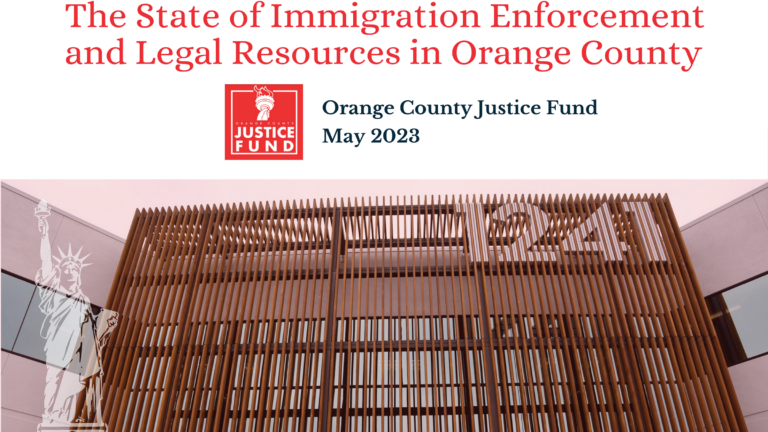
Immigrant Communities in Orange County: Reason for Hope and Continuing to Work
Few people look to Orange County and think about how it welcomes and integrates its immigrant communities. As the birthplace of the infamous proposition 187—a proposition aimed at denying undocumented immigrants access to social services—it is easy to narrowly focus on this anti-immigrant legacy. As one of the California counties with the largest number of transfers between the criminal legal system and immigration enforcement, it is easy to feel that Orange County continues to be dominated by xenophobic policies. Yet an active immigrant rights movement not only exists in Orange County but has made considerable noteworthy gains throughout the years that are reshaping this county.
As part of the Orange County Justice Fund (OCJF), a non-profit dedicated to uplifting immigrant rights, we set out to examine the larger infrastructure of immigration enforcement and resources within the area. This resulted in OCJF’s first research report titled, The State of Immigration Enforcement and Resources in Orange County. Drawing from interviews and organizational documents, we take an in-depth examination of the history of immigrant rights, the gains, and the continuing challenges for Orange County immigrants—specifically those facing the immigration enforcement system. Knowing this history can strengthen responses to the formidable challenges currently facing immigrants, including the new immigration court, the high rates of cooperation among law enforcement, and the dearth of legal service providers in the region.
The Orange County immigrant rights movement has fiercely fought through the years to build immigrant belonging in the County at large. A key admirable gain—in large part due to LGBTQ+ activists—is the successful advocacy to shut down three immigration detention centers. On the heels of this, the Santa Ana City Council created the Santa Ana Deportation Defense Fund to provide legal representation for local residents in deportation processes. These gains meant that the reach of immigration enforcement narrowed and some immigrants would be provided with immigration attorneys.
The introduction of the new Santa Ana Immigration Court is a considerable ramp up of immigration enforcement in Orange County. Instituted in November 2021, the Santa Ana Immigration Court already has 22,417 pending deportation cases. Each of these cases represents an individual with ties to families and communities. While detention centers no longer exist in Orange County, this immigration court continues to have the power to deport individuals every time hearings are held.
Despite this gargantuan challenge the resources in Orange County as detailed in our report make it feel like a David-and-Goliath story. Santa Ana has the only deportation defense fund in the county that provides its’ resident beneficiaries with legal representation. Notably, it contracted with an outside non-profit at a time when no local non-profits had the capacity to do deportation work. Only recently did one non-profit legal service organization start receiving funding from the California Department of Social Services (a state-source) to represent deportation cases. Apart from these resources, there are some resources on higher education campuses, such as the UCI Immigration Clinic, California State University, Fullerton, and a number of community colleges. In trying to find the number of private immigration attorneys, we found data that suggests that less than one hundred exist. Attorneys for immigration cases, especially deportation, are a scarce resource in Orange County.
This is felt by the immigrant communities across Orange County. As Laura Hernandez, the coordinator of the Orange County Rapid Response Network, is quoted in our report stated, “When I was finally released from [immigration] custody, I tried to find an attorney to help me fight for the ability to remain in the only country I have ever known. I called, left messages, and called back. Everyone was at capacity.”
This led us to suggest an alternative approach of looking into other models of empowering immigrants in removal proceedings or deportation apart from just immigration attorneys. While a commonly proposed policy solution is additional funding for more immigration attorneys, Orange County already has a limited number of attorneys to begin with.
Among the few resources that immigrants from Orange County have available is a bond fund, a legal orientation program, and community participatory defense programs. While these programs are also serving a limited number of immigrants facing deportation, these programs represent an opportunity to scale up in strategies where communities are centered. Better and more realistic alternatives exist other than just providing attorneys to immigrants in removal.
While these are daunting challenges when thinking of how to create a welcoming Orange County, the local immigrant rights movement has always risen to these challenges. Recently, the Council on American-Islamic Relations, the Coalition for Humane Immigrant Rights LA, and others, successfully advocated for the Orange County Board of Supervisors to create an Office of Immigration Affairs.
Immigrant rights-focused groups such as VietRISE, Harbor Institute, National Day Laborer Organizing Network, and others, continue to push the Orange County Board of Supervisors to more explicitly forefront equity concerns as they establish this office. Chief among their concerns is the need to serve underserved immigrant communities vulnerable to detention and deportation and currently without access to legal representation. This is a strategic opportunity to use the lessons from the past to shape an Orange County that centers on values of welcoming, belonging, and diversity. This is the Orange County we hope to build.
About the authors:

Blanca A. Ramirez, PhD, is a sociologist broadly interested in international migration, professions, and the law. She earned her PhD in Sociology at the University of Southern California. Sabrina Rivera is the Executive Director of the Orange County Justice Fund (OCJF). She received her JD from Loyola Law School, Los Angeles, and her BA in Chicana/o Studies and Political Science from California State University, Dominguez Hills.
© 2023. This work is licensed under a CC BY-NC-ND 4.0 license.